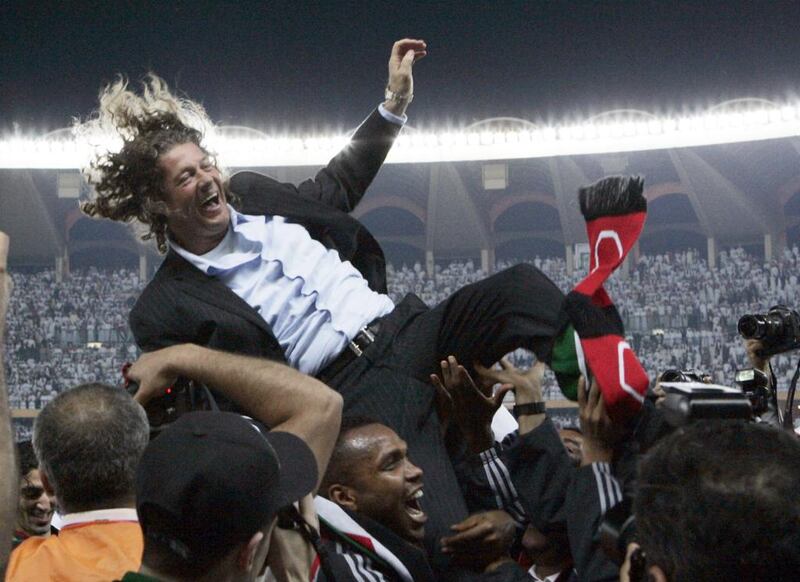The Gulf Cup had not been kind to the UAE national team in the new millennium.
The 15th, 16th and 17th stagings of the competition had, unusually, taken place in consecutive years between 2002 and 2004. The UAE did not make the top four in any of these tournaments. In 2002, they finished last.
In 2007, things were different. The Gulf Cup was being held in the UAE for the third time and the team had a bona fide star for the first time in years.
[ Read more: UAE’s lost generation still has not been found ]
Above all, they had Bruno Metsu as manager.
The Frenchman had guided Senegal to the quarter-finals of the 2002 World Cup. A year later, he won the Asian Champions League with Al Ain.
“If you put a stone in Metsu’s hand, it will turn to gold,” said Mohammed Suroor, a member of the 2007 UAE Gulf Cup squad.
No surprise, then, that the team should start in the worst possible way to leave seasoned Gulf Cup watchers nodding their heads in resigned exasperation.
In the opening match against the previous tournament’s runners-up, Oman, the UAE fell two goals behind before an hour had been played.
Even at this early stage, Emirati fans must have thought that a first cup triumph remained as distant as ever.
There was a sliver of good news. Ismail Matar, the young forward on whose shoulders so much rested, scored for the UAE, although there was no comeback. It was a hint at what was to come.
The UAE players and their restless fans had to wait three days for redemption. Conveniently, it came against the competition’s weakest team, Yemen, who had joined the tournament in 2003.
Defeat was not an option and the UAE made hard work of a 2-1 win. Still, at least they had kick-started their campaign.
A 2-1 defeat of Kuwait on the same day had guaranteed Oman a last-four appearance.
It meant a straight shoot-out for the second semi-final spot between the Emiratis and Kuwaitis in the last group match, three days later.
The Kuwait team was a shadow of previous ones that had racked up an impressive nine titles, but it still took one of the most dramatic matches of the tournament for the UAE to progress.
Matar gave the UAE a first-minute lead then Bader Al Mutawa equalised on the half-hour mark.
[ Read more: UAE’s Ismail Matar scored early and late for champions ]
Three minutes later, the UAE went ahead thanks to Al Ahli striker Faisal Khalil, but it was a lead they held for just two minutes as Fahd Al Fahd levelled for Kuwait.
It set up a tense second half, as both teams were aware that a loss would eliminate them, though a draw favoured the UAE.
Step forward Matar, who scored with a volley in injury time to send the UAE into the last four.
In Group B, Saudi Arabia and Bahrain had finished first and second, setting up semi-finals with the UAE at Al Nahyan Stadium, and Oman at Mohammed bin Zayed Stadium, respectively.
Having dominated Gulf and Asian football for so long, the Saudis, too, were going through a fallow period.
Metsu and his players knew that with the swell of support growing behind them they had a great chance.
Hard times or not, the Saudis were not pushovers, and a scoreless 90 minutes followed.
In minute 91, however, the UAE’s world turned as Matar scored yet another injury-time winner at Al Nahyan Stadium, home of his beloved Al Wahda, to put the Emiratis in the final.
Expectations rose to unprecedented levels and anything but a victory in the final at Zayed Sports City stadium against Oman would be a crushing disappointment.
Amid scenes rarely seen in the Emirates before, Matar (who else?) scored in the 72nd minute with an almost identical strike to his semi-final winner.
As the stadium erupted, the Emirati players, like soldiers on parade, saluted the nation’s leaders in the royal box.
Twenty minutes later, the UAE were finally Gulf Cup champions.
For Metsu and his team, a place in Emirati history was assured.
The UAE would repeat that achievement six years later, but the joy, on home soil, that the first one brought will remain one of the country’s great sporting moments.
akhaled@thenational.ae
Follow our sports coverage on Twitter @SprtNationalUAE





